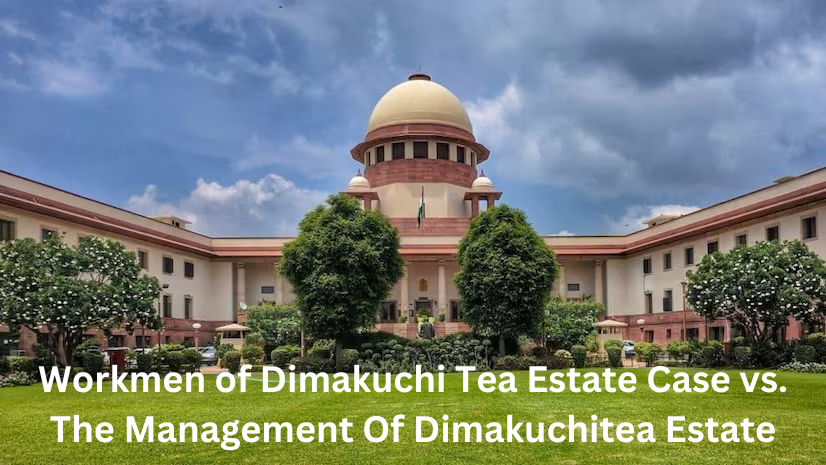The case of Workmen of Dimakuchi Tea Estate vs The Management of Dimakuchi Tea Estate is a landmark ruling by the Supreme Court of India. This case addressed the definition of an “industrial dispute”. This was done under the Industrial Disputes Act, of 1947. The bench included judges consisting of Chief Justice Sudhi Ranjan Das, Justice S. K. Das and Justice A. K. Sarkar. Continue reading to learn all about the Dimakuchi Tea Estate Case.
Workmen of Dimakuchi Tea Estate vs The Management of Dimakuchi Tea Estate
Background of the Dimakuchi Tea Estate Case Dispute
The dispute arose at the Dimakuchi estate, where the workers took up the cause of Dr. K. P. Banerjee. An Assistant Medical Officer had been dismissed from his position. This was done without a formal hearing and he received a month’s salary. However, he accepted the payment and left the estate. The workers believed that his dismissal was unfair. For this, they sought to contest this decision.
Key Legal Issue: Defining an “Industrial Dispute”
They referred the issue to the government for resolution. This was done under Section 10 of the Industrial Act. However, both the initial tribunal and the Appellate Industrial Tribunal determined that the dispute did not identify as an “industrial dispute”. This was because Dr Banerjee did not meet the definition of a “workman” as per the Act.
The main issue under this was whether a dispute involving someone who is not identified as a “workman” could still be considered under “industrial dispute”. This had to be considered under Section 2(k) of the Industrial Disputes Act, of 1947. Under this section, an industrial dispute is identified as any dispute between employers and employees, or between employees. This has to be related to employment conditions, working conditions or other related issues.
Also read: Ajay Goswami vs Union of India Case | Freedom of Expression Debate
The Supreme Court’s Ruling
The Supreme Court delivered its majority opinion through Justice K.S. Das. He pointed out that the phrase “any person” in Section 2(k) should not simply be interpreted in its usual sense. Instead, it has to be understood within the context and purpose of the Industrial Disputes Act. The court emphasised that “any person” could not be limited to only workers or employees, according to the Act.
Two Test to Identify an Industrial Dispute
Justice Das laid down two important tests to identify an industrial dispute. The first is known as the Real Dispute Test, wherein the dispute should be genuine. There should be no possibility of resolving it with relief or compensation provided by one party to another. Secondly, the individual involved in the dispute must be someone whose Employment status, non-employment, terms of employment or working conditions matter to the parties engaged in the dispute. This determination is considered on a case-by-case basis. This takes into account the specific facts and context surrounding the issue.
Applying the Tests to the Dimakuchi Tea Estate Case
Applying these tests to the Dimakuchi case, Justice Das concluded that the dispute was not an industrial dispute. This was because Dr Banerjee did not belong to the category of workmen defined by the Act. Therefore, the appeal made by the workers of the estate was dismissed.
A Dissenting Opinion
Justice A. K. Sarkar dissented from the majority opinion. In his argument, he stated that the term, “any person” in Section 2(k) should indeed be interpreted in its natural sense. This could include disputes concerning employees who are not identified as workmen.
Justice Sarkar’s View on Industrial Disputes
Justice Sarkar stated that the primary objective of the Industrial Disputes Act was to maintain industrial peace. The Act does not specify that the interests of a workman must be a pre-condition for classifying as an industrial dispute.
Justice Sarkar believed that the interests of all workers, regardless of their specific job classification, should be protected. Therefore, a private dispute involving a non-workman could still be identified as an industrial dispute.
Also read: Kuldeep Kumar vs UT Chandigarh: Supreme Court Justice in Mayoral Election
The Impact of the Ruling
The judgment in Workmen of Dimakuchi Tea Estate vs The Management of Dimakuchi Tea Estate is an iconic case. This has shaped the interpretation of the term “industrial dispute” in India. The Supreme Court’s ruling clarified that a dispute must exhibit specific characteristics to be classified correctly under the Act. It must focus on the real and substantial interests of the parties involved.
Conclusion: Shaping Labour Law in India
The case focuses on the complexities that arise when interpreting legal definitions. When it comes to labour law, there are several ongoing debates about the rights and classifications of workers. This ruling sets an example of how to navigate industrial disputes. This has to be done by engaging with the definitions in a practical manner. As rightly pointed out, the definitions must be observed within the context of the issue. Also, they must be examined through all the interests of the parties.
Also read: Gopal Subramaniam Net Worth & Legal Fees: Major Cases of the Renowned Indian Jurist
